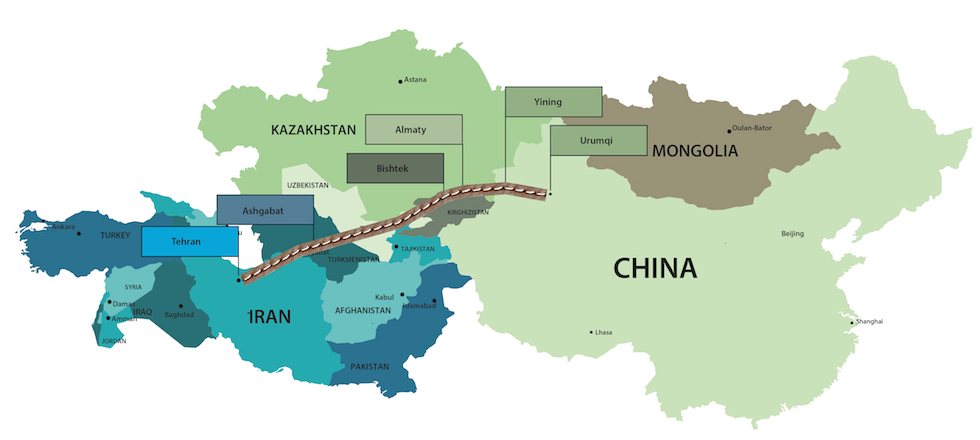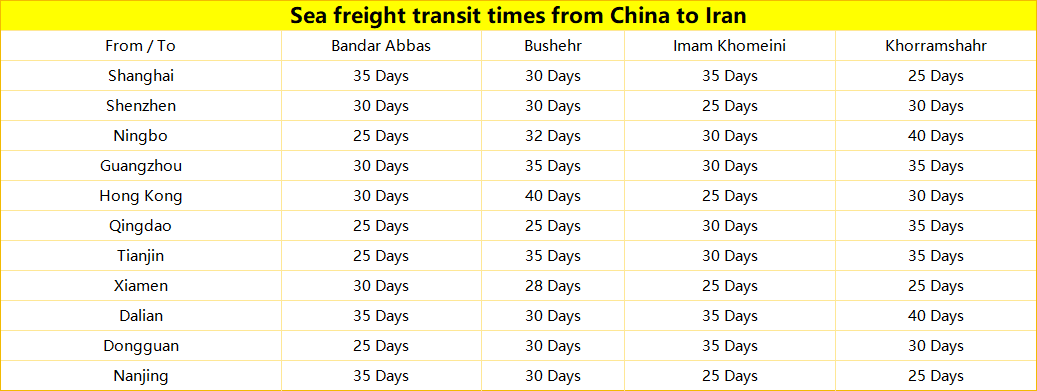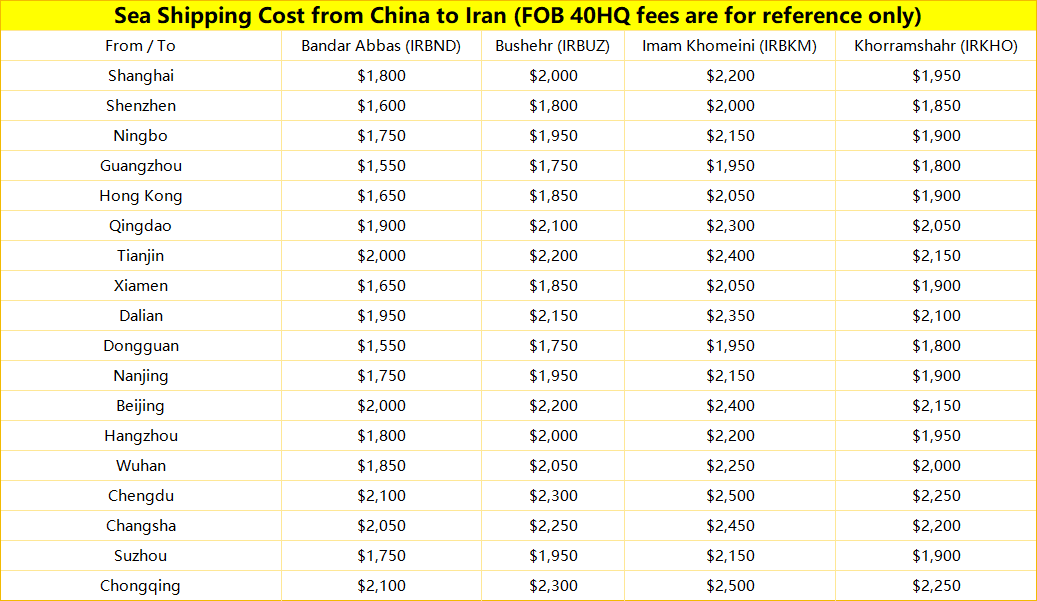Be your Logistics Department in China
Customized logistics solutions, your logistics expert in China
Customized logistics solutions, Shipping from China to the World
Tel:+8613424475220 Email:info@viputrans.com 
Shipping from China to Iran: A Comprehensive Guide for International Trade
China and Iran maintain a strong trade relationship despite U.S. sanctions, with China being Iran’s largest trading partner. Below is an analysis of 2024 trade data (estimates) and 2025 projections, covering key sectors, challenges, and future trends.
2024 Estimated Trade Volume: 180–200billion(upfrom 150 billion in 2023)
China’s Exports to Iran: $110–120 billion (Machinery, electronics, consumer goods)
China’s Imports from Iran: $70–80 billion (Oil, petrochemicals, minerals)
Growth Rate: ~15–20% increase from 2023 (due to deeper economic cooperation under the 25-year strategic agreement)
Increased Oil Trade via "Shadow Fleet" – China imports ~800,000–1 million barrels/day (officially reported as Malaysian/Omani oil).
Non-Oil Trade Growth – More Iranian petrochemicals, minerals, and agriculture exports to China.
Renminbi (RMB) Settlements – Over 70% of trade now settled in Chinese Yuan, reducing reliance on USD.
Category | Share | Key Products | Trend |
Machinery & Equipment | 40% | Industrial machines, power plants | ▲ +12% |
Electronics | 25% | Smartphones, home appliances | ▲ +18% |
Textiles & Apparel | 15% | Fabrics, ready-made garments | ▲ +8% |
Automotive Parts | 10% | EV batteries, engine components | ▲ +25% |
Chemicals & Plastics | 10% | Rubber, fertilizers | ▲ +5% |
Notable Trends:
Electric Vehicle (EV) Boom: Chinese EV makers (BYD, Geely) expanding in Iran.
Tech Dominance: Huawei, Xiaomi, and Transsion control 60% of Iran’s smartphone market.
Category | Share | Key Products | Trend |
Crude Oil | 65% | Heavy crude, condensates | ▲ +10% |
Petrochemicals | 20% | Methanol, polyethylene | ▲ +15% |
Minerals | 10% | Copper, iron ore | ▲ +5% |
Agriculture | 5% | Pistachios, saffron, dates | ▲ +20% |
Key Insight:
Oil Trade Resilience: Despite sanctions, China remains Iran’s top oil buyer via "gray market" channels.
Non-Oil Trade Growth: Iran is diversifying exports beyond oil (e.g., petrochemicals to China).
Total Trade Expected: $220–250 billion (driven by deeper BRI cooperation).
China’s Exports: $130–150 billion (More machinery, EVs, green tech).
China’s Imports: $90–100 billion (Oil, gas, minerals, agriculture).
Renewable Energy: China to export solar panels, wind turbines to Iran.
Electric Vehicles (EVs): Iran’s demand for Chinese EVs & batteries will surge.
Digital Economy: Huawei’s 5G & cloud services expansion in Iran.
U.S. Sanctions: Potential stricter enforcement if geopolitical tensions rise.
Currency Instability: Iranian rial depreciation may affect payments.
Logistics Costs: Shipping insurance premiums remain high due to sanctions.

As a professional international freight forwarder, understanding the logistics between China and Iran is crucial for smooth trade operations.
1. Regular Fees of Iranian Customs
Iranian customs impose several fees on imported goods, including:
- Customs duties (based on product type and value)
- Value-Added Tax (VAT) (typically 9%)
- Commercial benefit tax (3% on CIF value)
- Import registration fee
- Port and handling charges
These fees vary depending on the goods' classification and origin.
2. Taxes and Tariffs in Iran
Iran applies different tariff rates based on the Harmonized System (HS) code:
- Essential goods (0-4%): Medicines, food staples
- Raw materials (5-15%): Industrial inputs
- Luxury & non-essential goods (up to 70%): Electronics, cosmetics
Importers must check the latest Iranian customs tariff book for exact rates.
3. Classifications of Products by Iranian Customs
Iran categorizes goods under the HS Code system, including:
- Agricultural products
- Industrial machinery & equipment
- Chemicals & pharmaceuticals
- Textiles & apparel
- Electronics & home appliances
- Automotive parts & vehicles
Each category has specific import regulations and duties.
4. What Does China Export to Iran?
China is Iran’s largest trading partner, exporting:
- Machinery & industrial equipment
- Electronics & mobile phones
- Textiles & clothing
- Plastics & rubber products
- Automotive parts
- Steel & construction materials
5. Trade Relations Between China and Iran
China and Iran have strong economic ties, with a 25-year strategic partnership signed in 2021. Key aspects include:
- Oil-for-goods trade agreements
- Belt and Road Initiative (BRI) investments
- Preferential trade terms under Chinese financing
6. What Does China Import from Iran?
China mainly imports:
- Crude oil & petroleum products
- Petrochemicals
- Minerals (copper, iron ore)
- Agricultural products (pistachios, saffron)
7. Iranian Embargoed and Restricted Items
Due to sanctions, Iran restricts:
- Military & dual-use goods
- Advanced technology with potential nuclear applications
- Certain chemicals & pharmaceuticals
- Alcohol & pork products
Check updated sanction lists before shipping.
8. Air Freight from China to Iran
Iran Air Cargo: An Important Hub for Sino-Iranian Trade
Air freight is ideal for urgent shipments, with Tehran (IKA) and Mashhad (MHD) as key hubs.
Airlines Offering China-Iran Air Freight Services
- Mahan Air (W5) – Best for direct cargo flights
- Iran Air
- China Southern Airlines
- Emirates SkyCargo (via Dubai)
Advantages of Using Mahan Air (W5)
- Direct flights from Guangzhou & Beijing
- Competitive rates
- Reliable cargo capacity
Chinese Cities with Air Freight to Iran
- Beijing (PEK)
- Shanghai (PVG)
- Guangzhou (CAN)
- Shenzhen (SZX)
Iranian Cities Accepting Air Cargo
- Tehran (IKA)
- Mashhad (MHD)
- Shiraz (SYZ)
- Isfahan (IFN)
Air Freight Time & Cost


9. Ocean Shipping from China to Iran
Major Iranian Seaports
1. Bandar Abbas – Largest & most strategic port
2. Bandar Imam Khomeini
3. Chabahar Port (key for India-China-Iran trade)
4. Bushehr Port
5. Bandar Anzali
Best Seaport for China-Iran Shipping
Bandar Abbas handles 90% of China-Iran trade due to deep-water access and customs efficiency.
Ocean Shipping Time & Cost


Shipping Lines Serving China-Iran Routes
- COSCO Shipping
- IRISL (Islamic Republic of Iran Shipping Lines)
- MSC (Mediterranean Shipping Company)
- CMA CGM
- Evergreen Marine
- HMM(Hyundai Merchant Marine)
10. Door-to-Door Delivery from China to Iran
Services & Costs
- DDP (Delivered Duty Paid): Includes customs clearance & final delivery
- Cost: $2,500 - $6,000/20ft container
- Time: 25-40 days
11. Why Use VIPUTRANS to Ship from China to Iran?
- Expertise in Iranian customs clearance
- Competitive air & sea freight rates
- Door-to-door (DDP) solutions
- Real-time tracking & logistics support
Shipping from China to Iran requires careful planning regarding customs, transport modes, and costs. Partnering with an experienced freight forwarder like VIPUTRANS ensures smooth, compliant, and cost-effective logistics.
For the latest 2025 rates and regulations, consult a professional logistics provider.
Would you like a tailored quote for your shipment? Contact us today!
Please feel free to contact:Lora Yang E-mail: sales02@viputrans.com SKYPE|WECHAT|WHATSAPP|MOB:+86 13424468029
Copyright © 2003-2026 VIPU Supply Chain Logistics Co., Ltd. | All Rights Reserved
LOGISTICS | E-COMMERCIAL FULFILLMENT | ABOUT US | CASE | NEWS | VIDEO | CONTACT US
We will find the fastest or the cheapest way for your shipment. Please specify: where from, where to, what to ship.